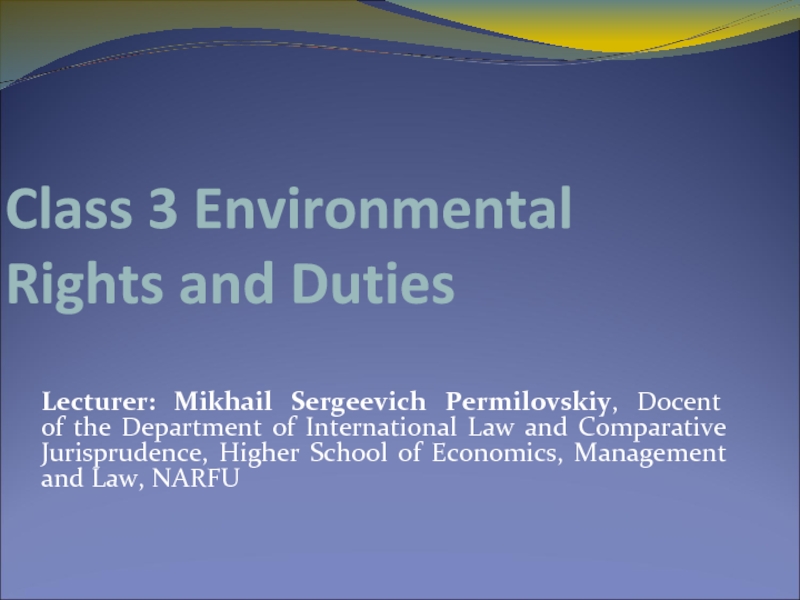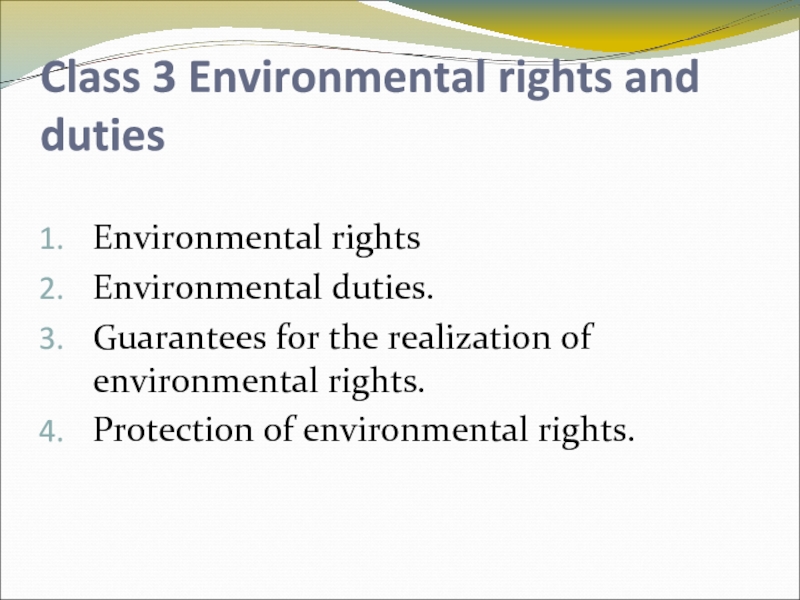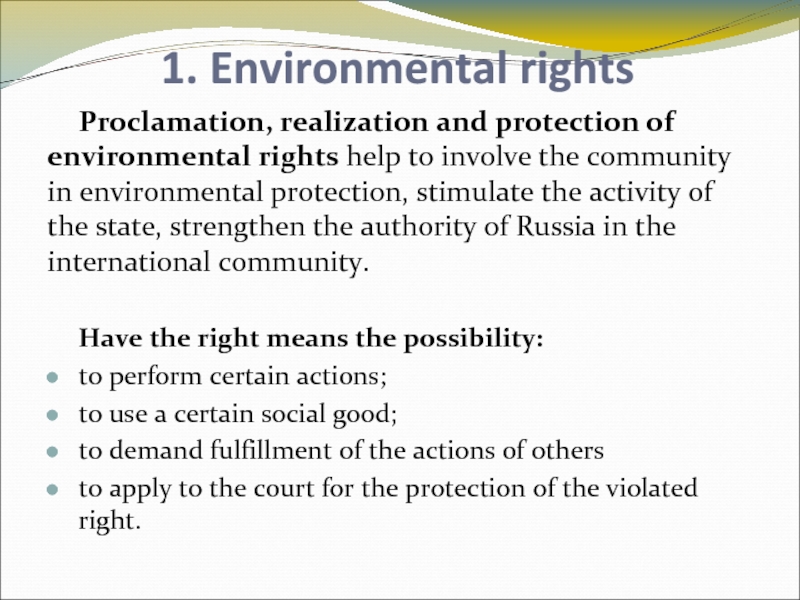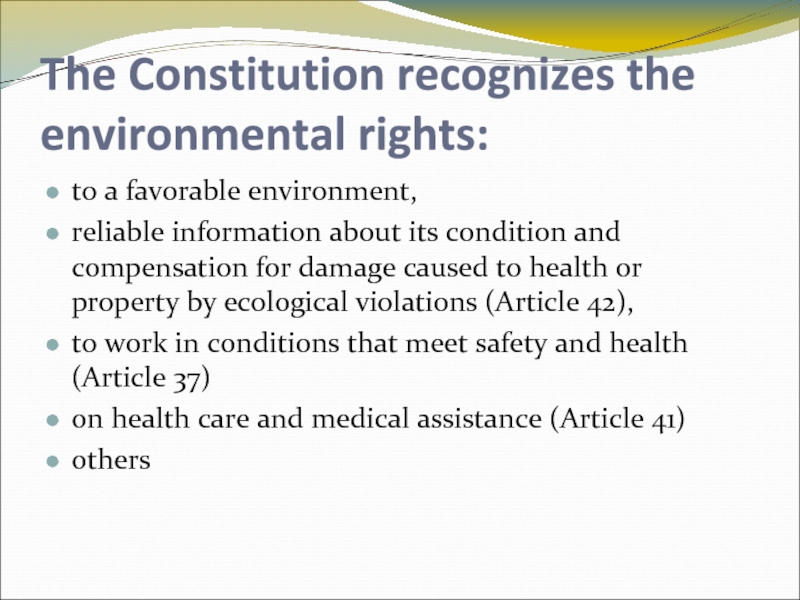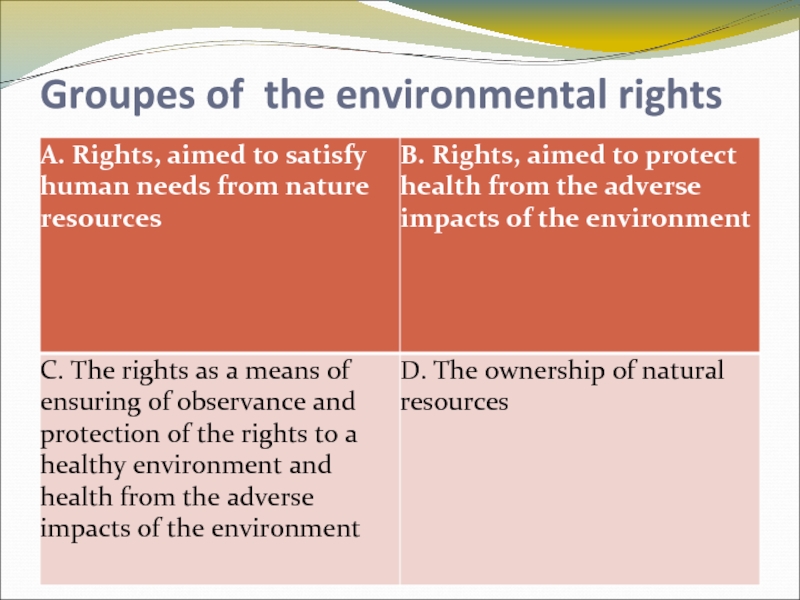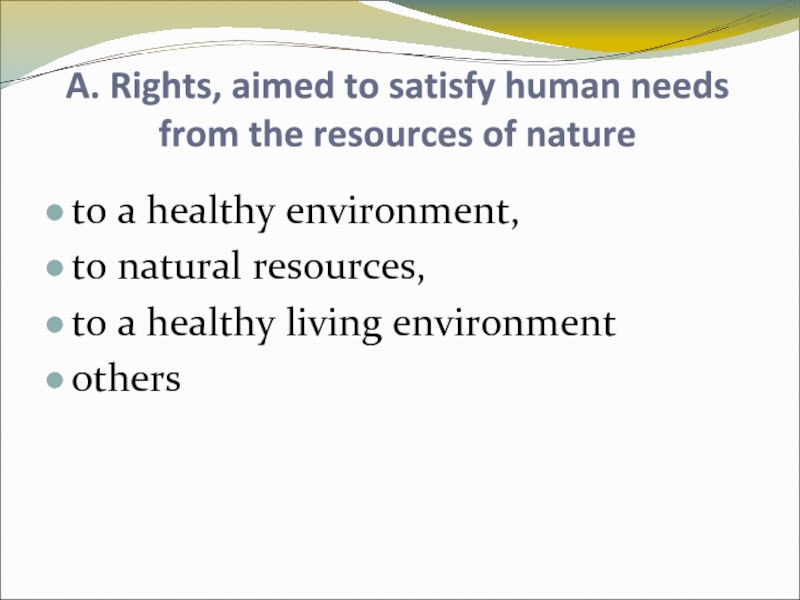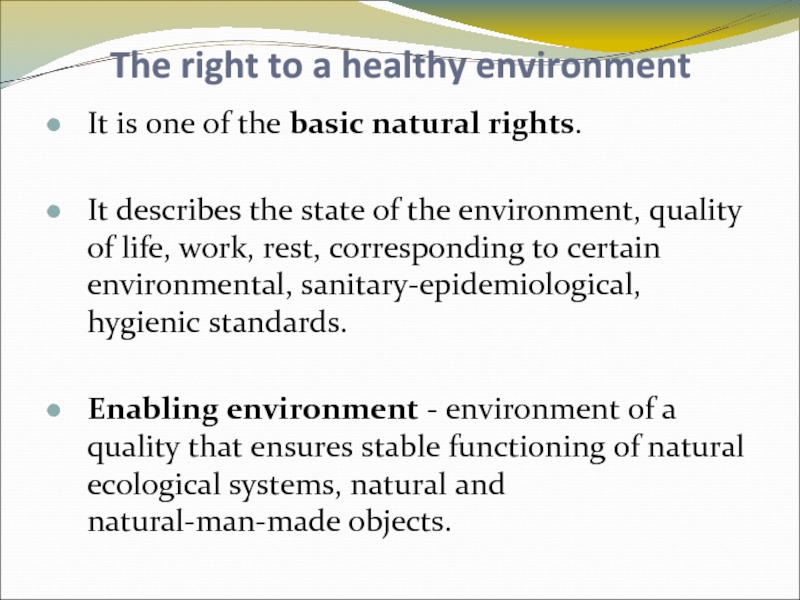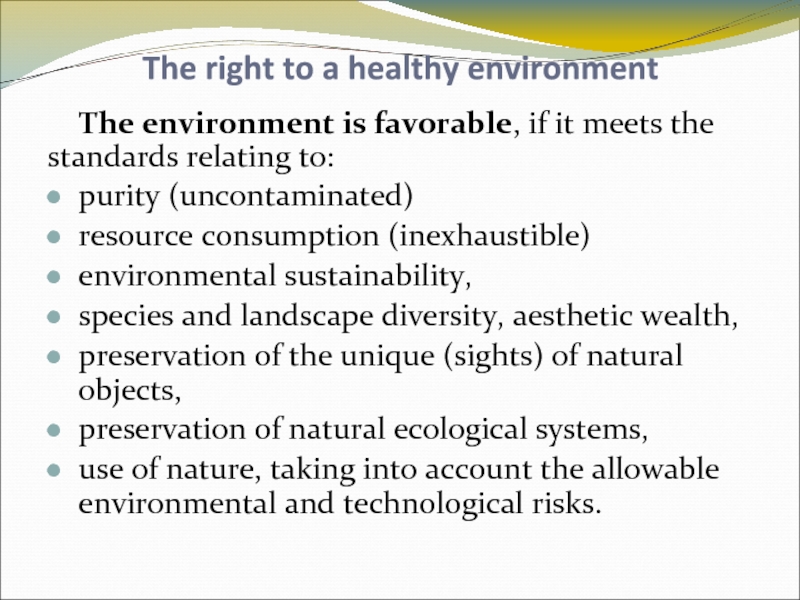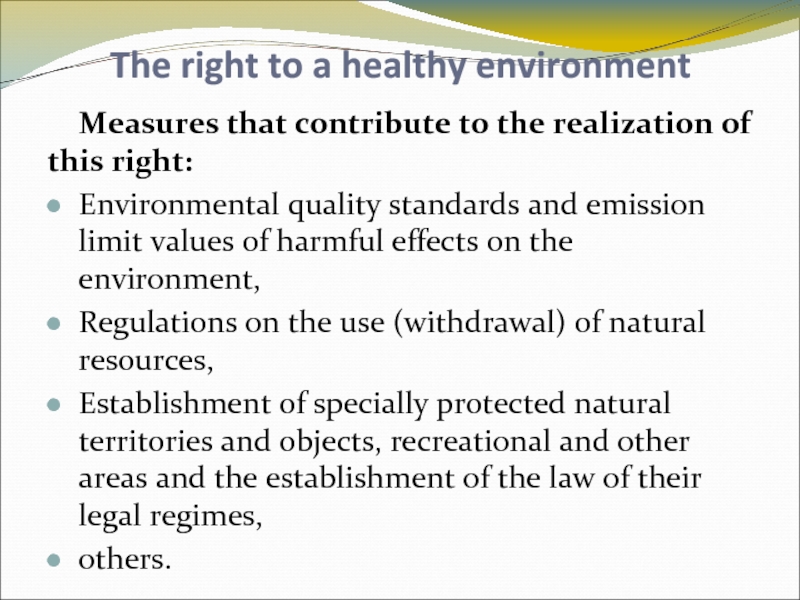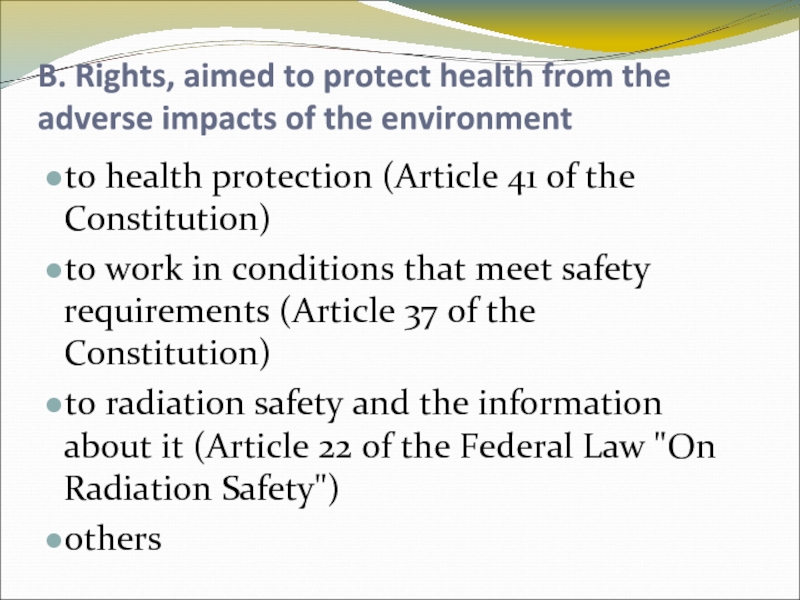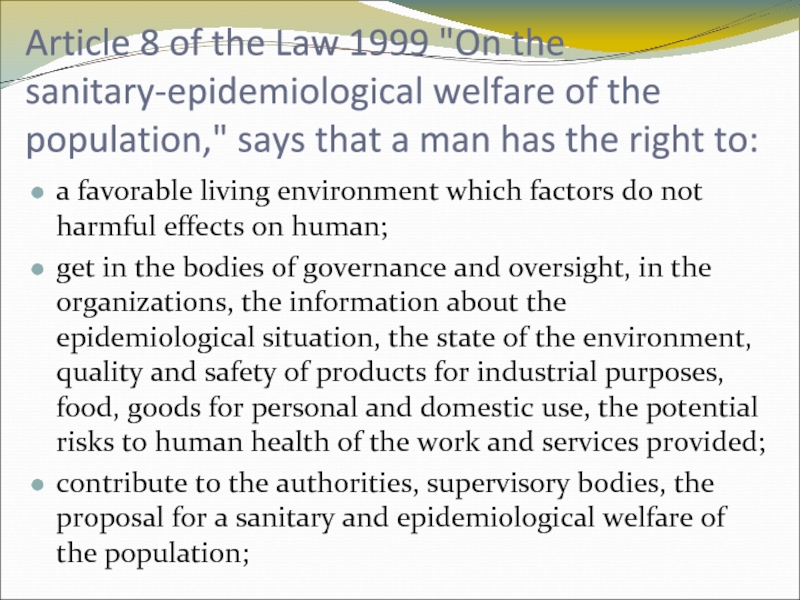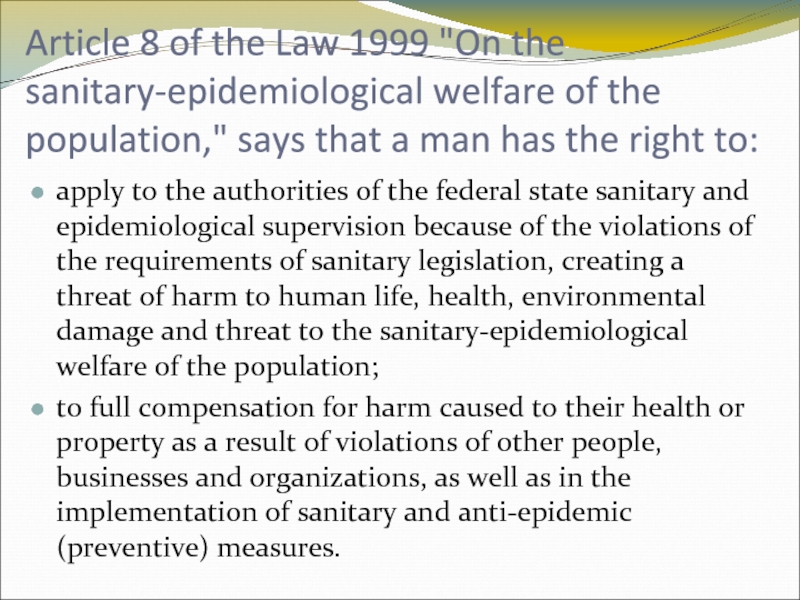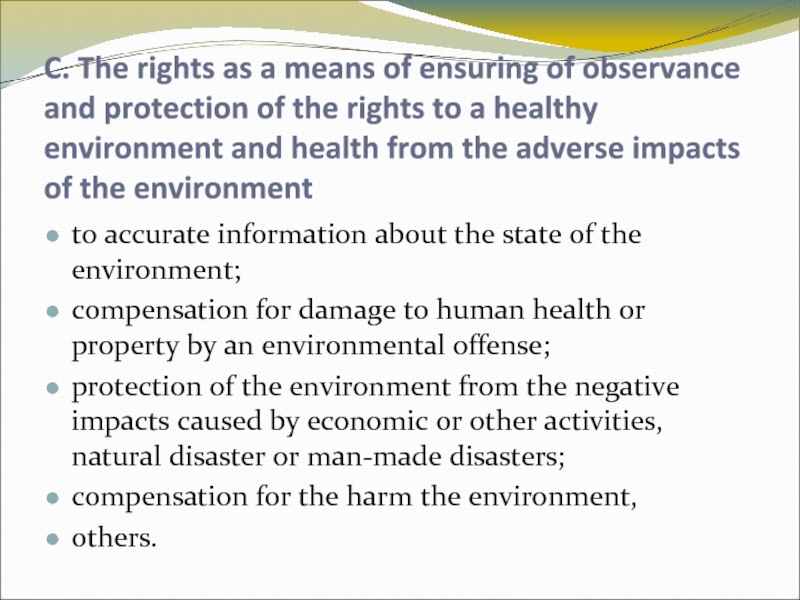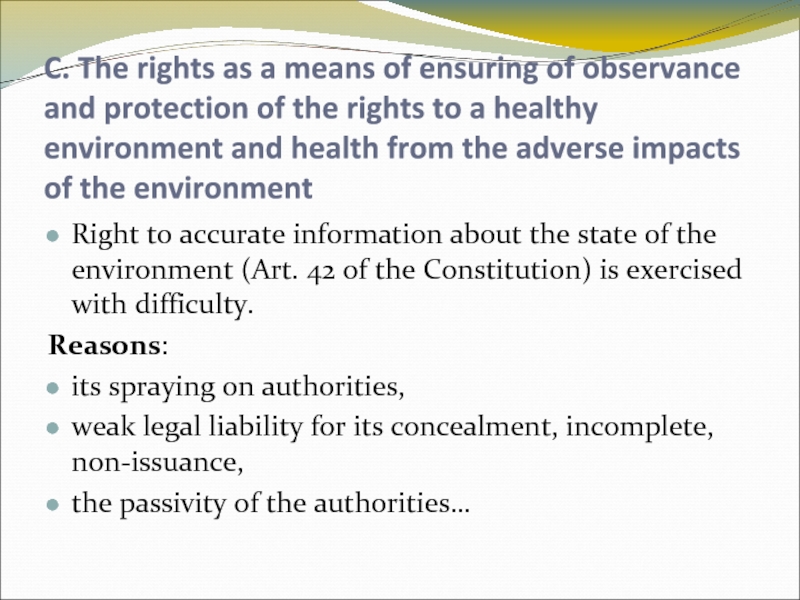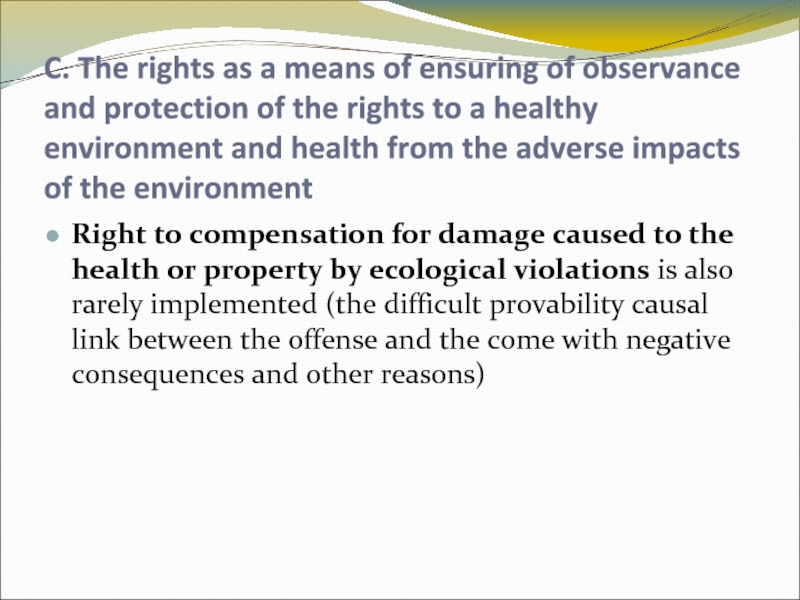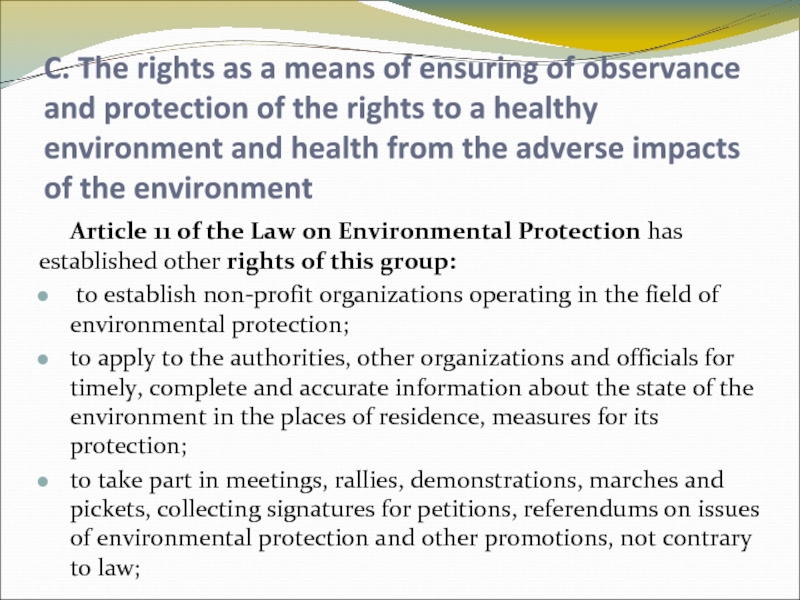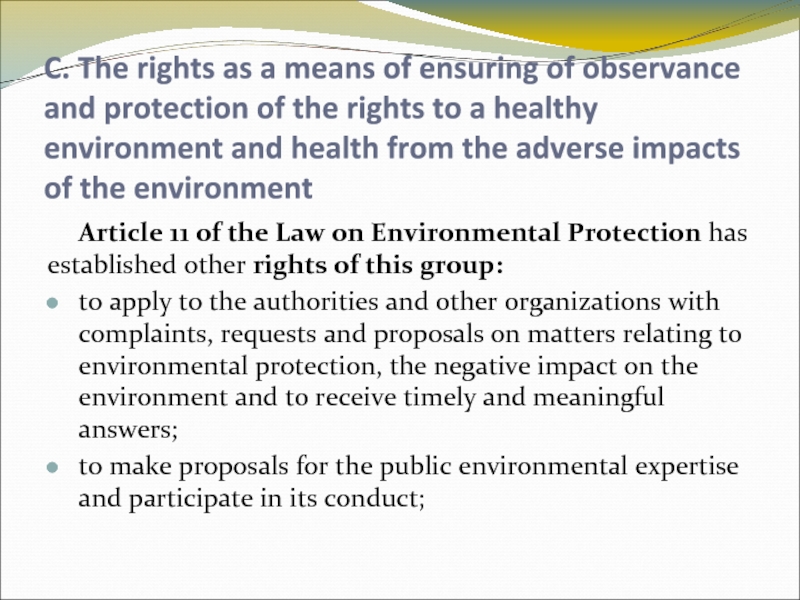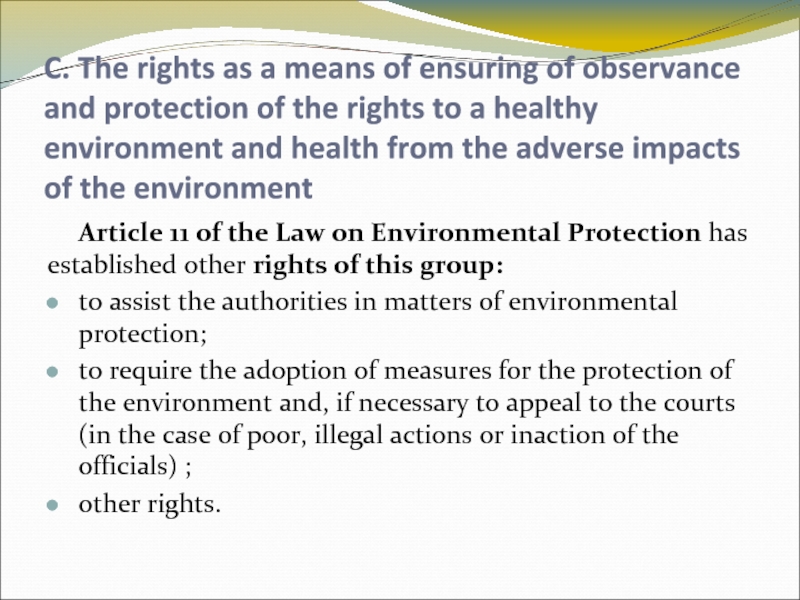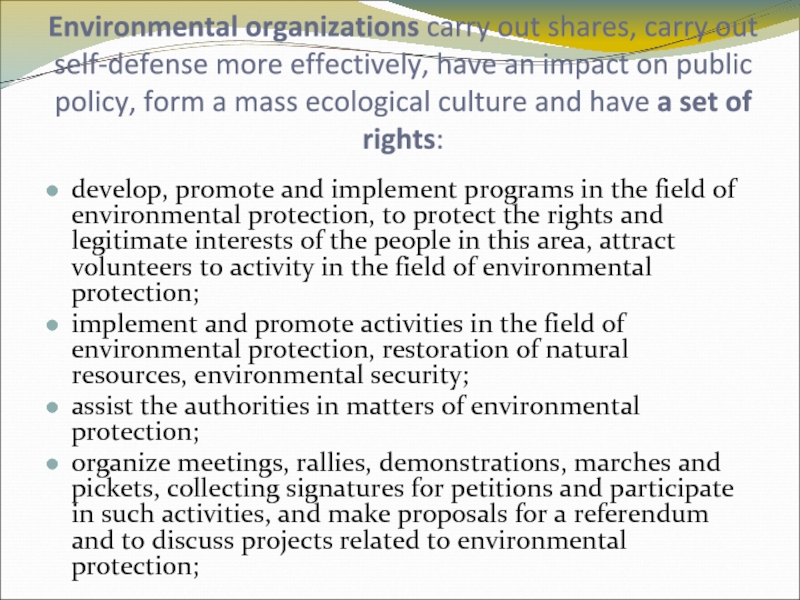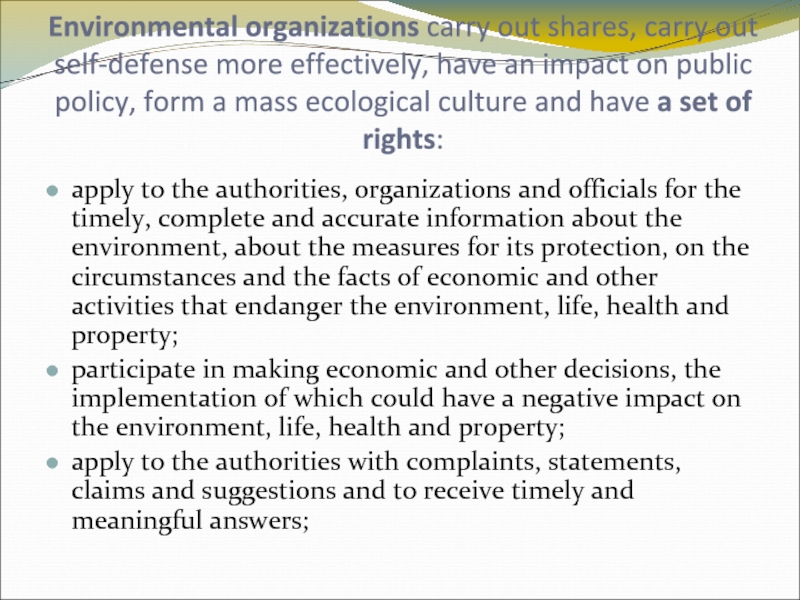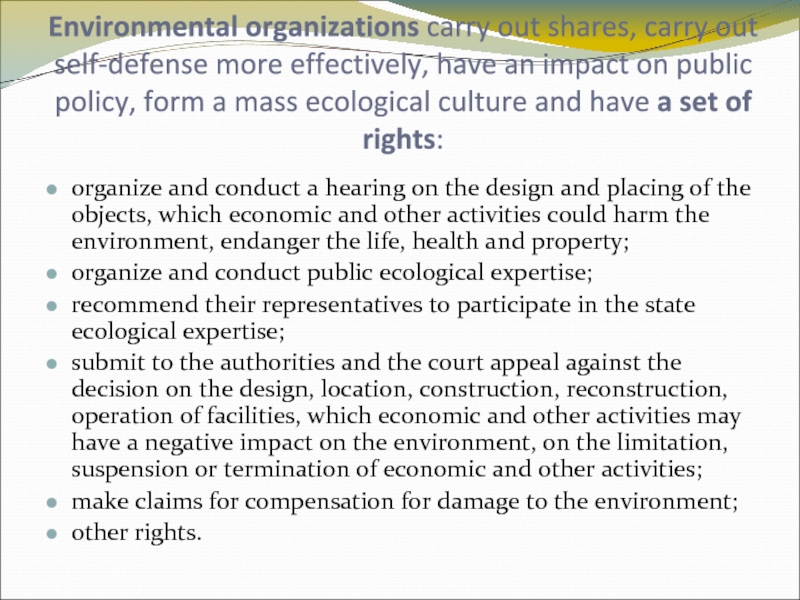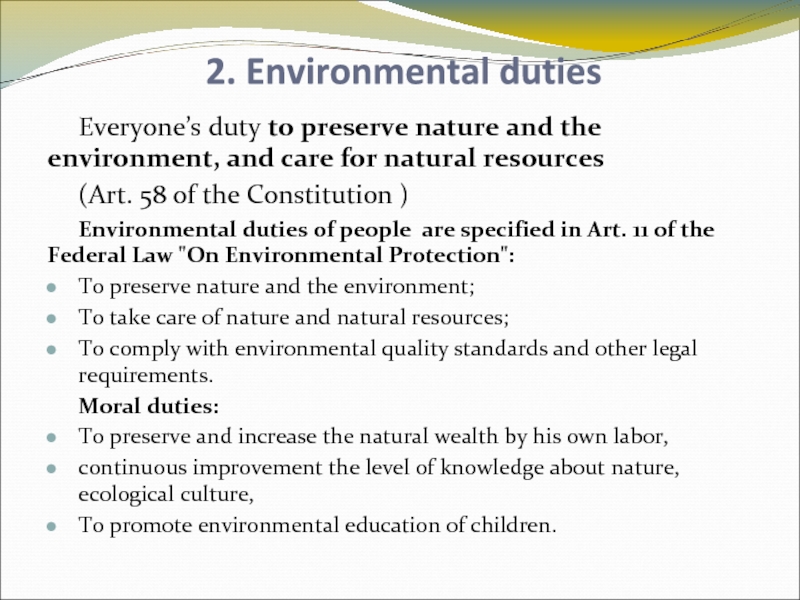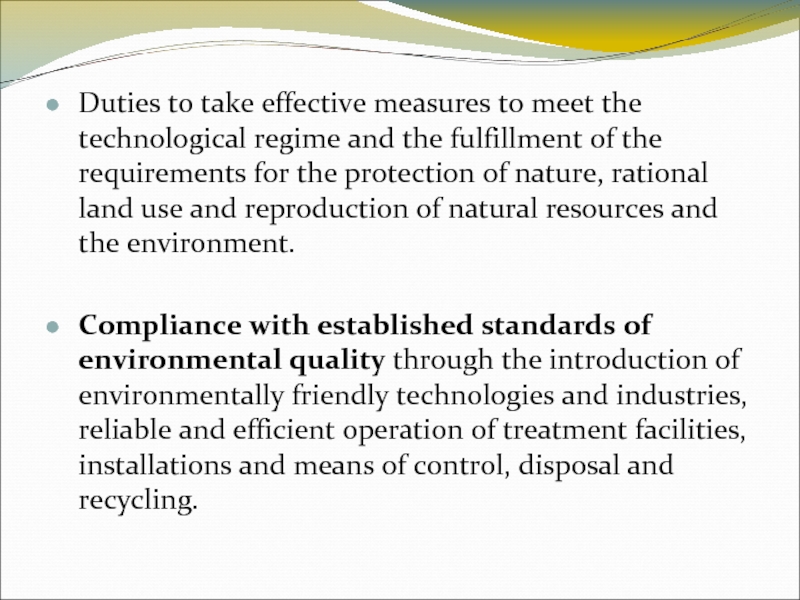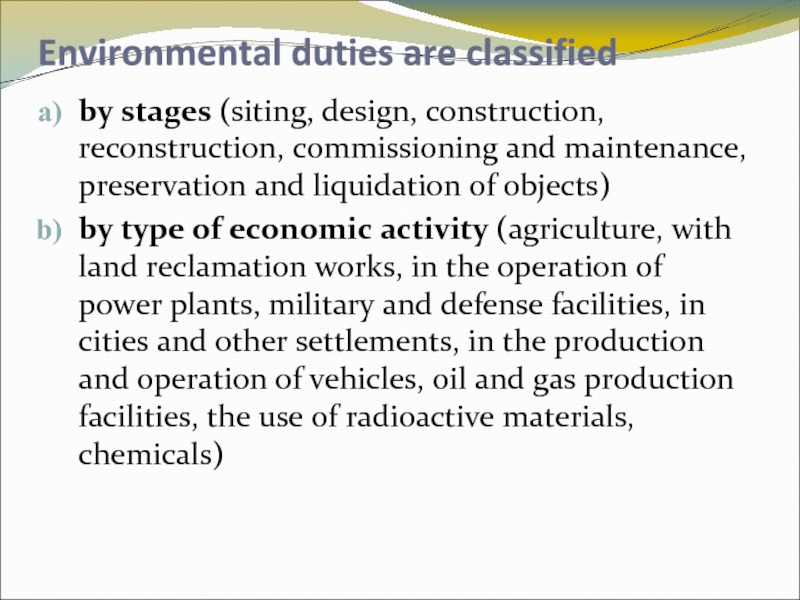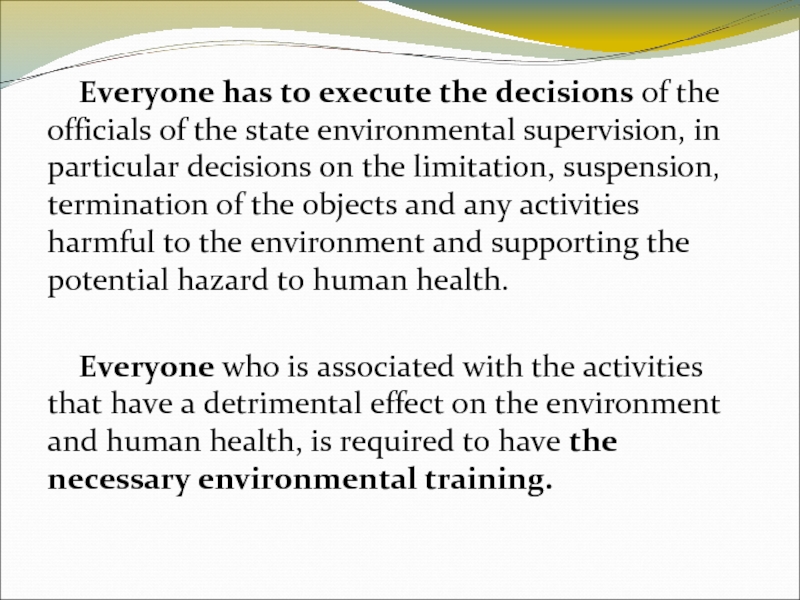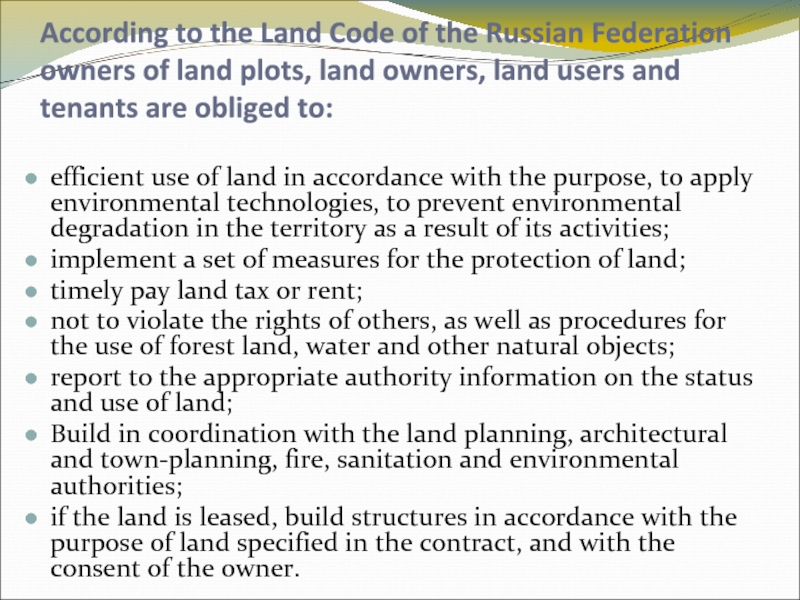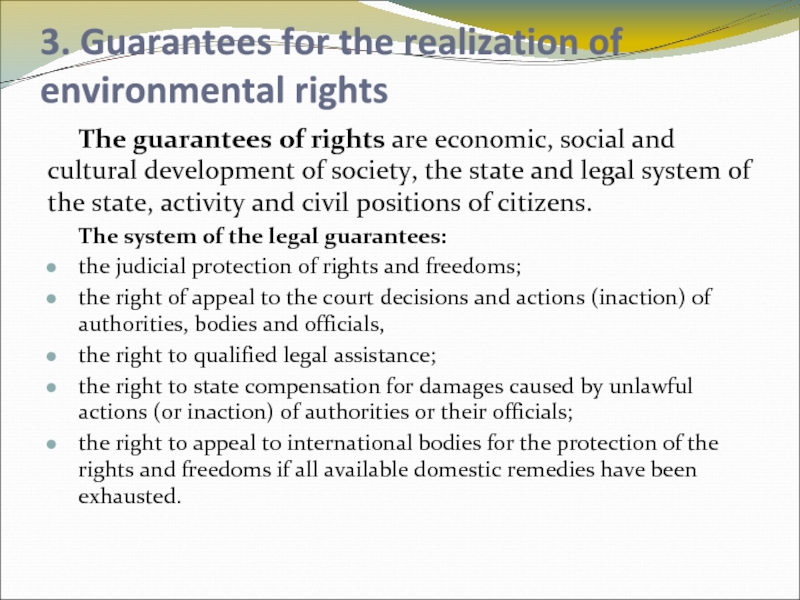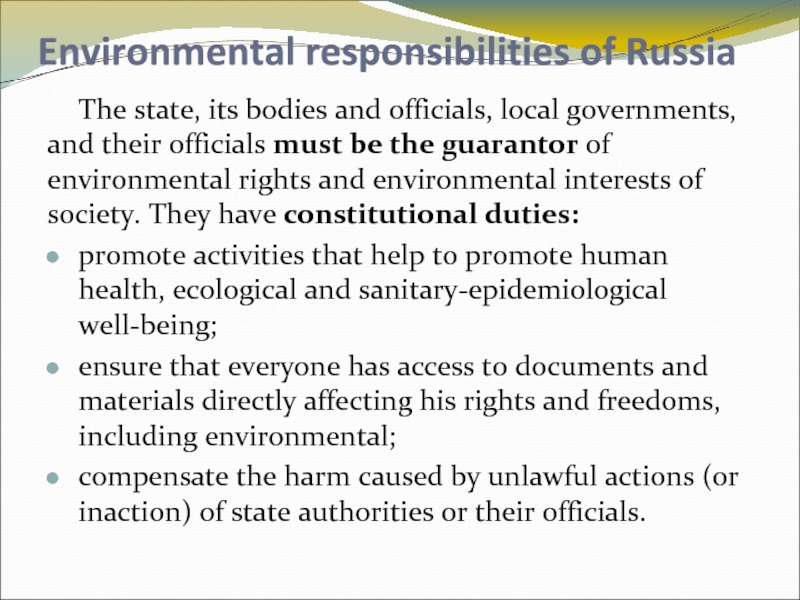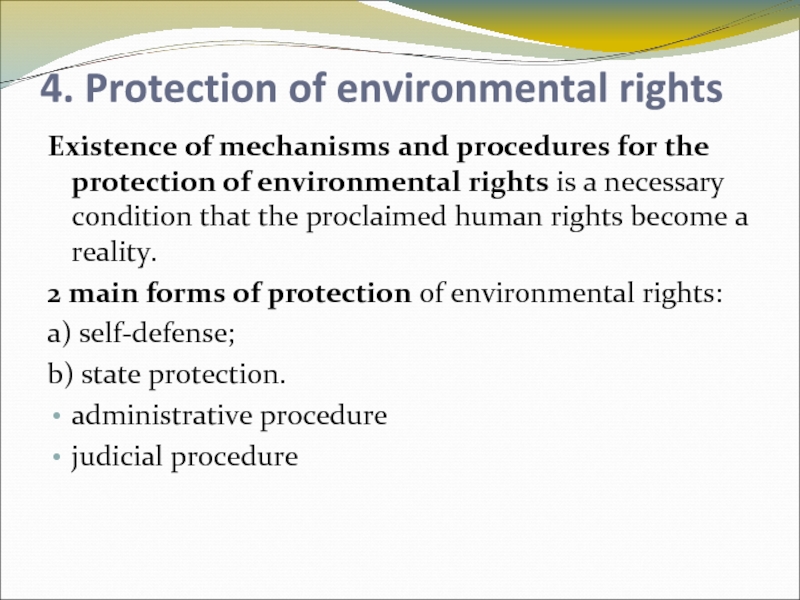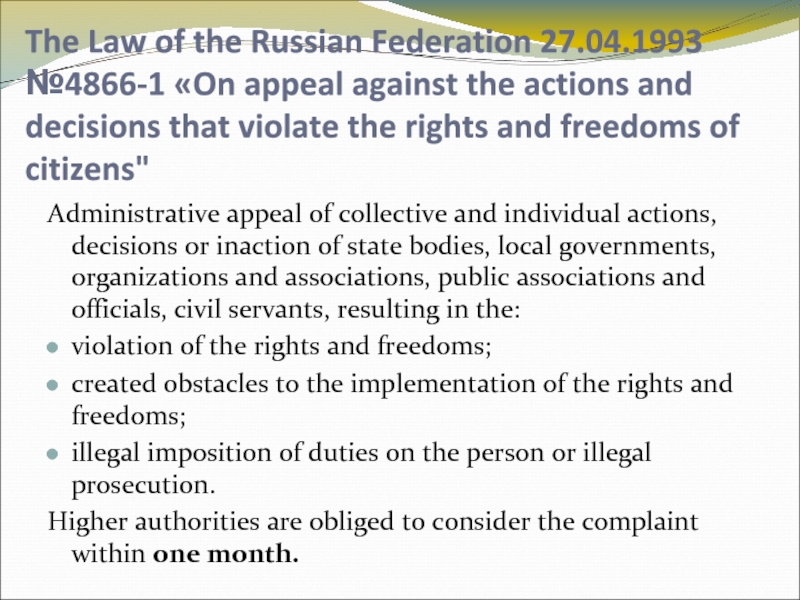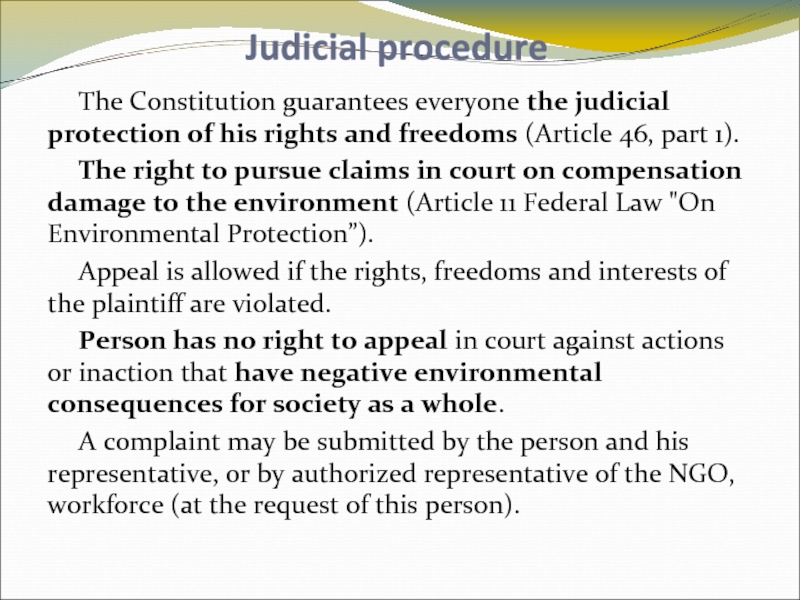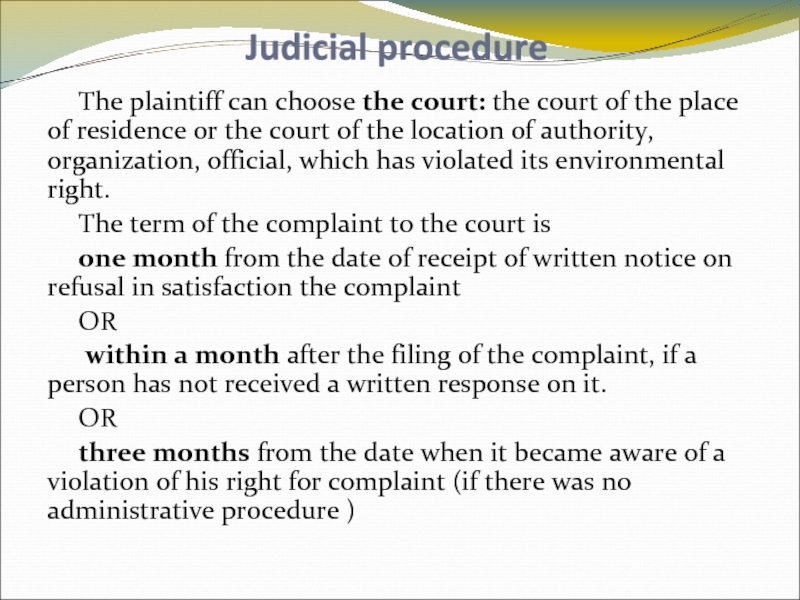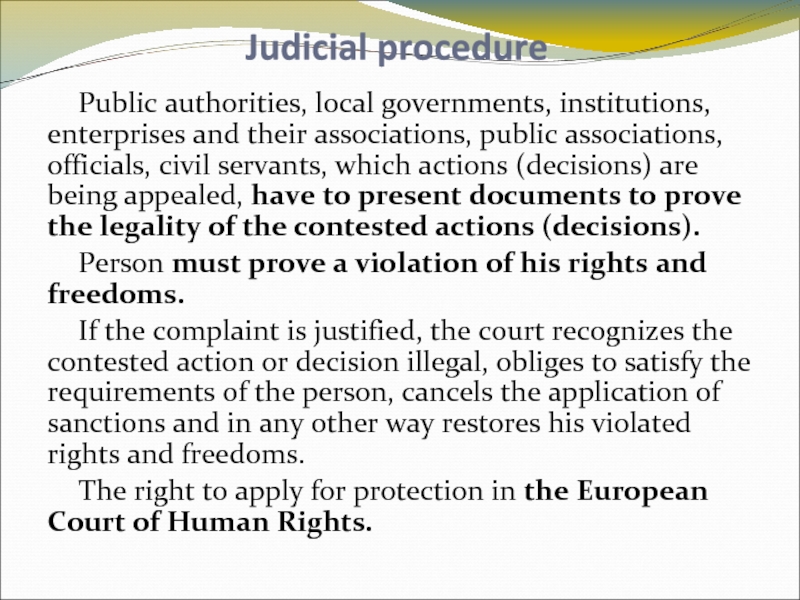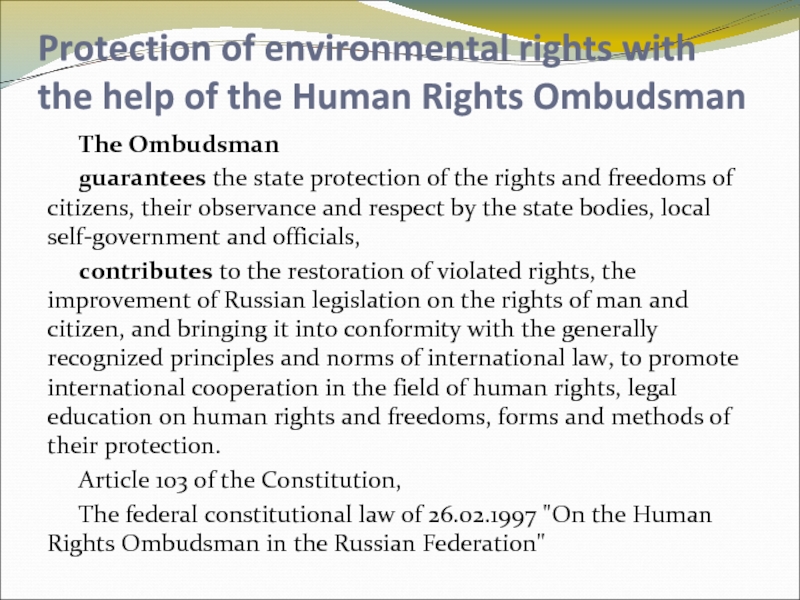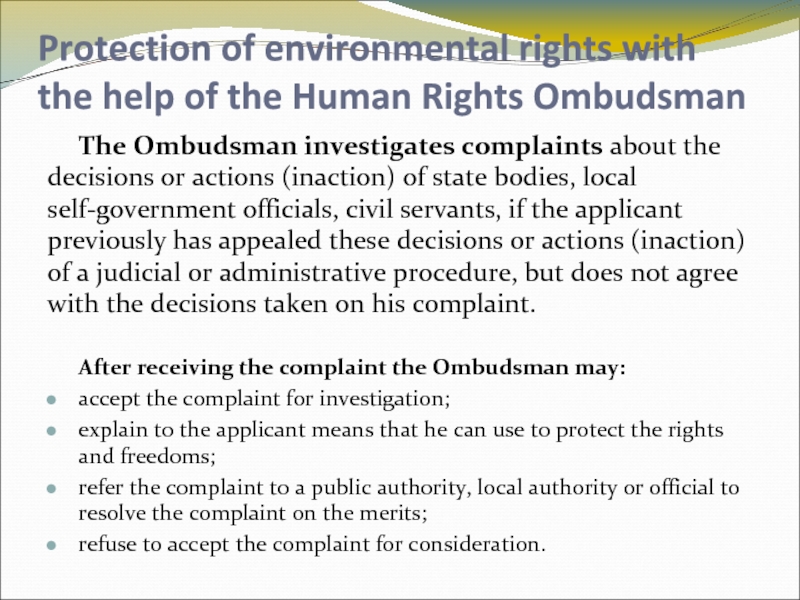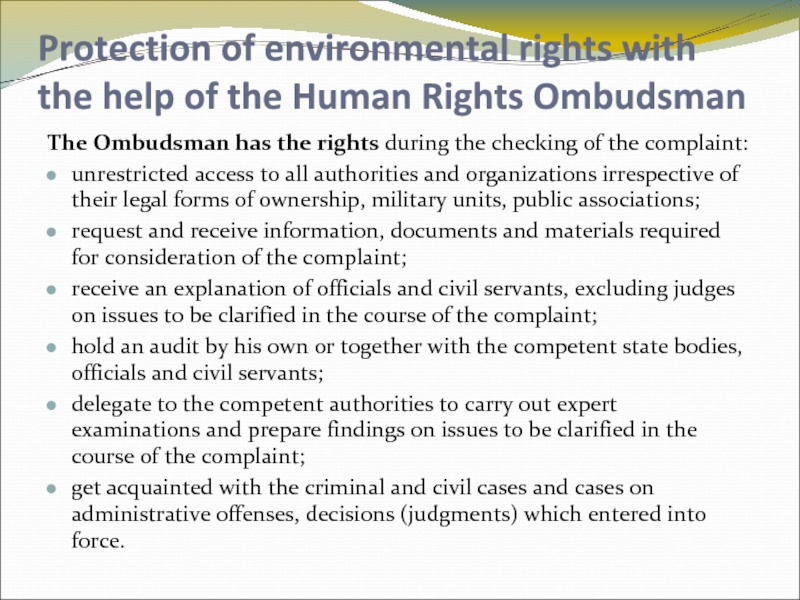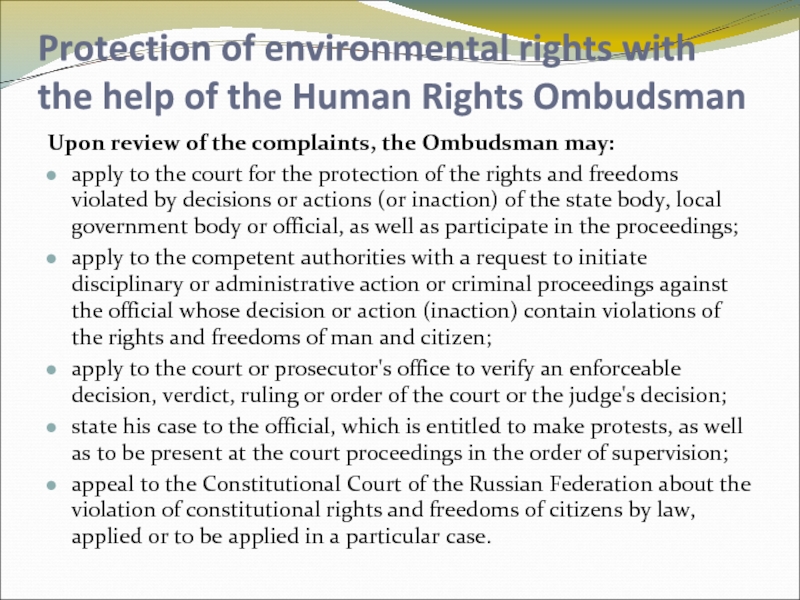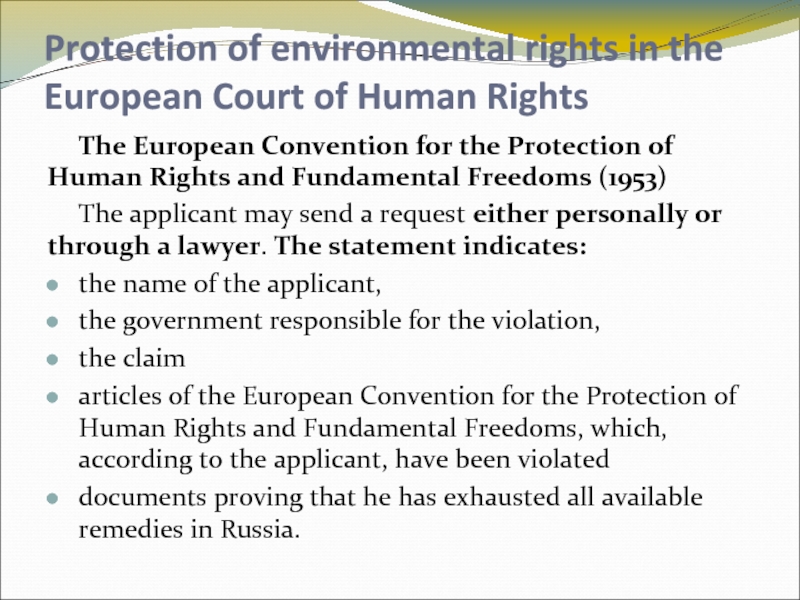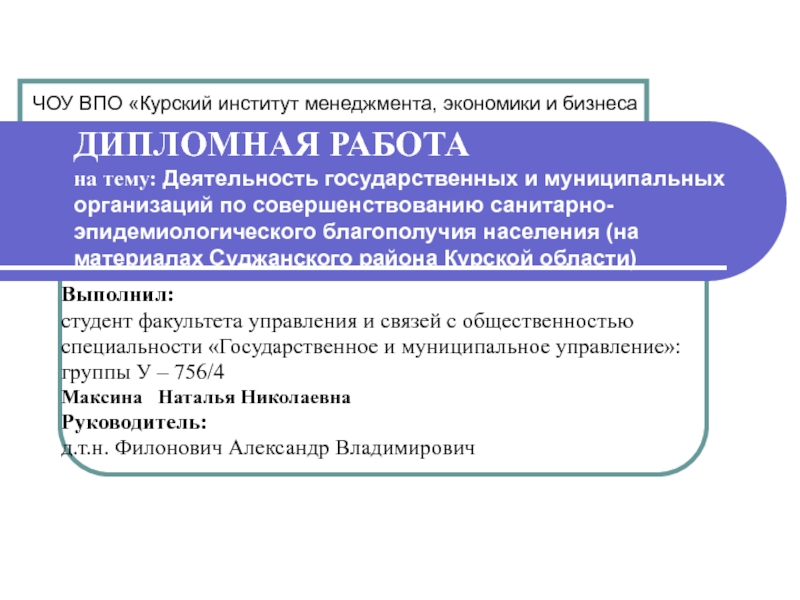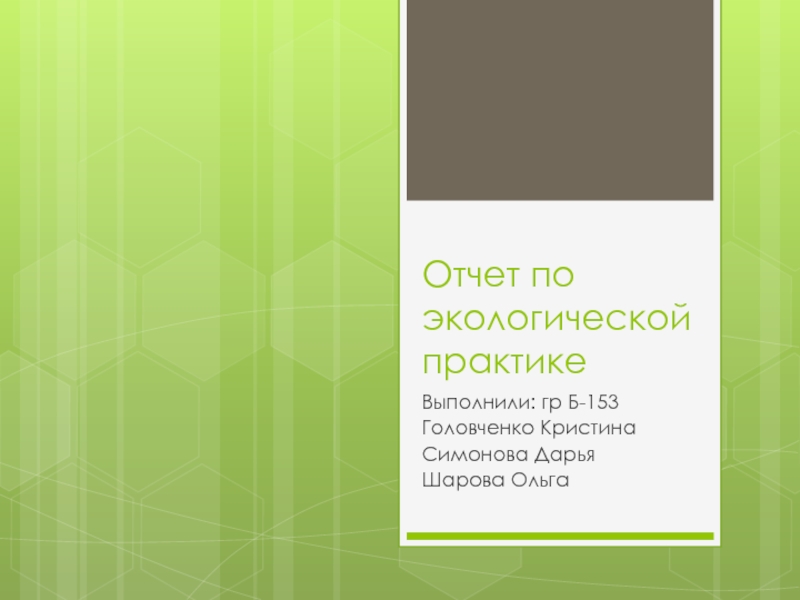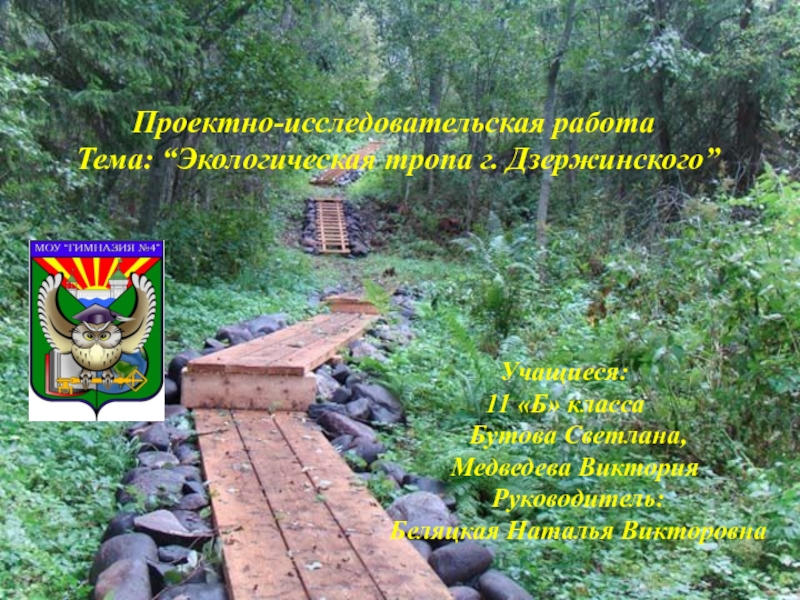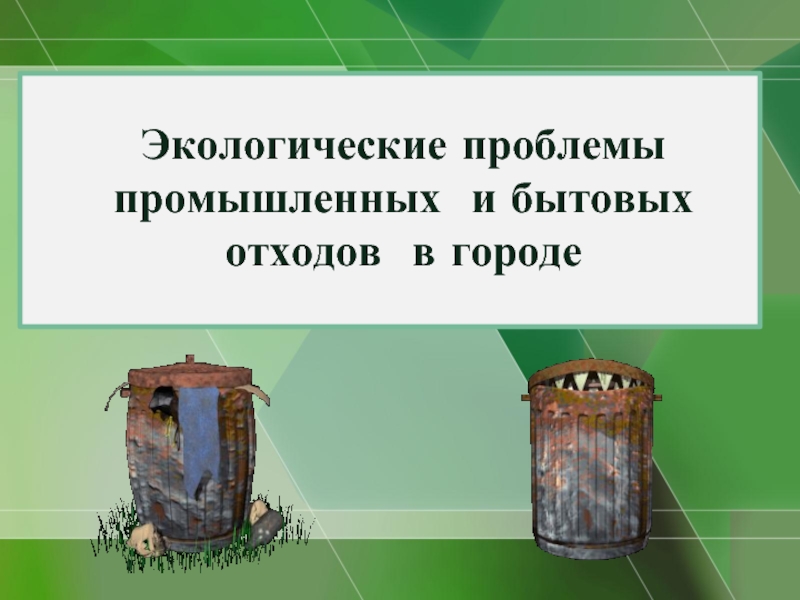- Главная
- Разное
- Дизайн
- Бизнес и предпринимательство
- Аналитика
- Образование
- Развлечения
- Красота и здоровье
- Финансы
- Государство
- Путешествия
- Спорт
- Недвижимость
- Армия
- Графика
- Культурология
- Еда и кулинария
- Лингвистика
- Английский язык
- Астрономия
- Алгебра
- Биология
- География
- Детские презентации
- Информатика
- История
- Литература
- Маркетинг
- Математика
- Медицина
- Менеджмент
- Музыка
- МХК
- Немецкий язык
- ОБЖ
- Обществознание
- Окружающий мир
- Педагогика
- Русский язык
- Технология
- Физика
- Философия
- Химия
- Шаблоны, картинки для презентаций
- Экология
- Экономика
- Юриспруденция
Class 3 Environmental rights and duties презентация
Содержание
- 1. Class 3 Environmental rights and duties
- 2. Class 3 Environmental rights and duties
- 3. 1. Environmental rights Proclamation, realization and protection
- 4. The Constitution recognizes the environmental rights: to
- 5. Groupes of the environmental rights
- 6. A. Rights, aimed to satisfy human needs
- 7. The right to a healthy environment It
- 8. The right to a healthy environment The
- 9. The right to a healthy environment Measures
- 10. B. Rights, aimed to protect health from
- 11. Article 8 of the Law 1999 "On
- 12. Article 8 of the Law 1999 "On
- 13. C. The rights as a means of
- 14. C. The rights as a means of
- 15. C. The rights as a means of
- 16. C. The rights as a means of
- 17. C. The rights as a means of
- 18. C. The rights as a means of
- 19. Environmental organizations carry out shares, carry out
- 20. Environmental organizations carry out shares, carry out
- 21. Environmental organizations carry out shares, carry out
- 22. 2. Environmental duties Everyone’s duty to preserve
- 23. Duties to take effective measures to
- 24. Environmental duties are classified by stages (siting,
- 25. Everyone has to execute the decisions
- 26. According to the Land Code of the
- 27. 3. Guarantees for the realization of environmental
- 28. Environmental responsibilities of Russia The state, its
- 29. 4. Protection of environmental rights Existence of
- 30. The Law of the Russian Federation 27.04.1993
- 31. Judicial procedure The Constitution guarantees everyone
- 32. Judicial procedure The plaintiff can choose
- 33. Judicial procedure Public authorities, local governments,
- 34. Protection of environmental rights with the help
- 35. Protection of environmental rights with the help
- 36. Protection of environmental rights with the help
- 37. Protection of environmental rights with the help
- 38. Protection of environmental rights in the European
- 39. Thank you for your attention
Слайд 1Class 3 Environmental Rights and Duties
Lecturer: Mikhail Sergeevich Permilovskiy, Docent
of
Слайд 2Class 3 Environmental rights and duties
Environmental rights
Environmental duties.
Guarantees for the realization
Protection of environmental rights.
Слайд 31. Environmental rights
Proclamation, realization and protection of environmental rights help to
Have the right means the possibility:
to perform certain actions;
to use a certain social good;
to demand fulfillment of the actions of others
to apply to the court for the protection of the violated right.
Слайд 4The Constitution recognizes the environmental rights:
to a favorable environment,
reliable information about
to work in conditions that meet safety and health (Article 37)
on health care and medical assistance (Article 41)
others
Слайд 6A. Rights, aimed to satisfy human needs from the resources of
to a healthy environment,
to natural resources,
to a healthy living environment
others
Слайд 7The right to a healthy environment
It is one of the basic
It describes the state of the environment, quality of life, work, rest, corresponding to certain environmental, sanitary-epidemiological, hygienic standards.
Enabling environment - environment of a quality that ensures stable functioning of natural ecological systems, natural and natural-man-made objects.
Слайд 8The right to a healthy environment
The environment is favorable, if it
purity (uncontaminated)
resource consumption (inexhaustible)
environmental sustainability,
species and landscape diversity, aesthetic wealth,
preservation of the unique (sights) of natural objects,
preservation of natural ecological systems,
use of nature, taking into account the allowable environmental and technological risks.
Слайд 9The right to a healthy environment
Measures that contribute to the realization
Environmental quality standards and emission limit values of harmful effects on the environment,
Regulations on the use (withdrawal) of natural resources,
Establishment of specially protected natural territories and objects, recreational and other areas and the establishment of the law of their legal regimes,
others.
Слайд 10B. Rights, aimed to protect health from the adverse impacts of
to health protection (Article 41 of the Constitution)
to work in conditions that meet safety requirements (Article 37 of the Constitution)
to radiation safety and the information about it (Article 22 of the Federal Law "On Radiation Safety")
others
Слайд 11Article 8 of the Law 1999 "On the sanitary-epidemiological welfare of
a favorable living environment which factors do not harmful effects on human;
get in the bodies of governance and oversight, in the organizations, the information about the epidemiological situation, the state of the environment, quality and safety of products for industrial purposes, food, goods for personal and domestic use, the potential risks to human health of the work and services provided;
contribute to the authorities, supervisory bodies, the proposal for a sanitary and epidemiological welfare of the population;
Слайд 12Article 8 of the Law 1999 "On the sanitary-epidemiological welfare of
apply to the authorities of the federal state sanitary and epidemiological supervision because of the violations of the requirements of sanitary legislation, creating a threat of harm to human life, health, environmental damage and threat to the sanitary-epidemiological welfare of the population;
to full compensation for harm caused to their health or property as a result of violations of other people, businesses and organizations, as well as in the implementation of sanitary and anti-epidemic (preventive) measures.
Слайд 13C. The rights as a means of ensuring of observance and
to accurate information about the state of the environment;
compensation for damage to human health or property by an environmental offense;
protection of the environment from the negative impacts caused by economic or other activities, natural disaster or man-made disasters;
compensation for the harm the environment,
others.
Слайд 14C. The rights as a means of ensuring of observance and
Right to accurate information about the state of the environment (Art. 42 of the Constitution) is exercised with difficulty.
Reasons:
its spraying on authorities,
weak legal liability for its concealment, incomplete, non-issuance,
the passivity of the authorities…
Слайд 15C. The rights as a means of ensuring of observance and
Right to compensation for damage caused to the health or property by ecological violations is also rarely implemented (the difficult provability causal link between the offense and the come with negative consequences and other reasons)
Слайд 16C. The rights as a means of ensuring of observance and
Article 11 of the Law on Environmental Protection has established other rights of this group:
to establish non-profit organizations operating in the field of environmental protection;
to apply to the authorities, other organizations and officials for timely, complete and accurate information about the state of the environment in the places of residence, measures for its protection;
to take part in meetings, rallies, demonstrations, marches and pickets, collecting signatures for petitions, referendums on issues of environmental protection and other promotions, not contrary to law;
Слайд 17C. The rights as a means of ensuring of observance and
Article 11 of the Law on Environmental Protection has established other rights of this group:
to apply to the authorities and other organizations with complaints, requests and proposals on matters relating to environmental protection, the negative impact on the environment and to receive timely and meaningful answers;
to make proposals for the public environmental expertise and participate in its conduct;
Слайд 18C. The rights as a means of ensuring of observance and
Article 11 of the Law on Environmental Protection has established other rights of this group:
to assist the authorities in matters of environmental protection;
to require the adoption of measures for the protection of the environment and, if necessary to appeal to the courts (in the case of poor, illegal actions or inaction of the officials) ;
other rights.
Слайд 19Environmental organizations carry out shares, carry out self-defense more effectively, have
develop, promote and implement programs in the field of environmental protection, to protect the rights and legitimate interests of the people in this area, attract volunteers to activity in the field of environmental protection;
implement and promote activities in the field of environmental protection, restoration of natural resources, environmental security;
assist the authorities in matters of environmental protection;
organize meetings, rallies, demonstrations, marches and pickets, collecting signatures for petitions and participate in such activities, and make proposals for a referendum and to discuss projects related to environmental protection;
Слайд 20Environmental organizations carry out shares, carry out self-defense more effectively, have
apply to the authorities, organizations and officials for the timely, complete and accurate information about the environment, about the measures for its protection, on the circumstances and the facts of economic and other activities that endanger the environment, life, health and property;
participate in making economic and other decisions, the implementation of which could have a negative impact on the environment, life, health and property;
apply to the authorities with complaints, statements, claims and suggestions and to receive timely and meaningful answers;
Слайд 21Environmental organizations carry out shares, carry out self-defense more effectively, have
organize and conduct a hearing on the design and placing of the objects, which economic and other activities could harm the environment, endanger the life, health and property;
organize and conduct public ecological expertise;
recommend their representatives to participate in the state ecological expertise;
submit to the authorities and the court appeal against the decision on the design, location, construction, reconstruction, operation of facilities, which economic and other activities may have a negative impact on the environment, on the limitation, suspension or termination of economic and other activities;
make claims for compensation for damage to the environment;
other rights.
Слайд 222. Environmental duties
Everyone’s duty to preserve nature and the environment, and
(Art. 58 of the Constitution )
Environmental duties of people are specified in Art. 11 of the Federal Law "On Environmental Protection":
To preserve nature and the environment;
To take care of nature and natural resources;
To comply with environmental quality standards and other legal requirements.
Moral duties:
To preserve and increase the natural wealth by his own labor,
continuous improvement the level of knowledge about nature, ecological culture,
To promote environmental education of children.
Слайд 23
Duties to take effective measures to meet the technological regime and
Compliance with established standards of environmental quality through the introduction of environmentally friendly technologies and industries, reliable and efficient operation of treatment facilities, installations and means of control, disposal and recycling.
Слайд 24Environmental duties are classified
by stages (siting, design, construction, reconstruction, commissioning and
by type of economic activity (agriculture, with land reclamation works, in the operation of power plants, military and defense facilities, in cities and other settlements, in the production and operation of vehicles, oil and gas production facilities, the use of radioactive materials, chemicals)
Слайд 25
Everyone has to execute the decisions of the officials of the
Everyone who is associated with the activities that have a detrimental effect on the environment and human health, is required to have the necessary environmental training.
Слайд 26According to the Land Code of the Russian Federation owners of
efficient use of land in accordance with the purpose, to apply environmental technologies, to prevent environmental degradation in the territory as a result of its activities;
implement a set of measures for the protection of land;
timely pay land tax or rent;
not to violate the rights of others, as well as procedures for the use of forest land, water and other natural objects;
report to the appropriate authority information on the status and use of land;
Build in coordination with the land planning, architectural and town-planning, fire, sanitation and environmental authorities;
if the land is leased, build structures in accordance with the purpose of land specified in the contract, and with the consent of the owner.
Слайд 273. Guarantees for the realization of environmental rights
The guarantees of rights
The system of the legal guarantees:
the judicial protection of rights and freedoms;
the right of appeal to the court decisions and actions (inaction) of authorities, bodies and officials,
the right to qualified legal assistance;
the right to state compensation for damages caused by unlawful actions (or inaction) of authorities or their officials;
the right to appeal to international bodies for the protection of the rights and freedoms if all available domestic remedies have been exhausted.
Слайд 28Environmental responsibilities of Russia
The state, its bodies and officials, local governments,
promote activities that help to promote human health, ecological and sanitary-epidemiological well-being;
ensure that everyone has access to documents and materials directly affecting his rights and freedoms, including environmental;
compensate the harm caused by unlawful actions (or inaction) of state authorities or their officials.
Слайд 294. Protection of environmental rights
Existence of mechanisms and procedures for the
2 main forms of protection of environmental rights:
a) self-defense;
b) state protection.
administrative procedure
judicial procedure
Слайд 30The Law of the Russian Federation 27.04.1993 №4866-1 «On appeal against
Administrative appeal of collective and individual actions, decisions or inaction of state bodies, local governments, organizations and associations, public associations and officials, civil servants, resulting in the:
violation of the rights and freedoms;
created obstacles to the implementation of the rights and freedoms;
illegal imposition of duties on the person or illegal prosecution.
Higher authorities are obliged to consider the complaint within one month.
Слайд 31Judicial procedure
The Constitution guarantees everyone the judicial protection of his
The right to pursue claims in court on compensation damage to the environment (Article 11 Federal Law "On Environmental Protection”).
Appeal is allowed if the rights, freedoms and interests of the plaintiff are violated.
Person has no right to appeal in court against actions or inaction that have negative environmental consequences for society as a whole.
A complaint may be submitted by the person and his representative, or by authorized representative of the NGO, workforce (at the request of this person).
Слайд 32Judicial procedure
The plaintiff can choose the court: the court of
The term of the complaint to the court is
one month from the date of receipt of written notice on refusal in satisfaction the complaint
OR
within a month after the filing of the complaint, if a person has not received a written response on it.
OR
three months from the date when it became aware of a violation of his right for complaint (if there was no administrative procedure )
Слайд 33Judicial procedure
Public authorities, local governments, institutions, enterprises and their associations,
Person must prove a violation of his rights and freedoms.
If the complaint is justified, the court recognizes the contested action or decision illegal, obliges to satisfy the requirements of the person, cancels the application of sanctions and in any other way restores his violated rights and freedoms.
The right to apply for protection in the European Court of Human Rights.
Слайд 34Protection of environmental rights with the help of the Human Rights
The Ombudsman
guarantees the state protection of the rights and freedoms of citizens, their observance and respect by the state bodies, local self-government and officials,
contributes to the restoration of violated rights, the improvement of Russian legislation on the rights of man and citizen, and bringing it into conformity with the generally recognized principles and norms of international law, to promote international cooperation in the field of human rights, legal education on human rights and freedoms, forms and methods of their protection.
Article 103 of the Constitution,
The federal constitutional law of 26.02.1997 "On the Human Rights Ombudsman in the Russian Federation"
Слайд 35Protection of environmental rights with the help of the Human Rights
The Ombudsman investigates complaints about the decisions or actions (inaction) of state bodies, local self-government officials, civil servants, if the applicant previously has appealed these decisions or actions (inaction) of a judicial or administrative procedure, but does not agree with the decisions taken on his complaint.
After receiving the complaint the Ombudsman may:
accept the complaint for investigation;
explain to the applicant means that he can use to protect the rights and freedoms;
refer the complaint to a public authority, local authority or official to resolve the complaint on the merits;
refuse to accept the complaint for consideration.
Слайд 36Protection of environmental rights with the help of the Human Rights
The Ombudsman has the rights during the checking of the complaint:
unrestricted access to all authorities and organizations irrespective of their legal forms of ownership, military units, public associations;
request and receive information, documents and materials required for consideration of the complaint;
receive an explanation of officials and civil servants, excluding judges on issues to be clarified in the course of the complaint;
hold an audit by his own or together with the competent state bodies, officials and civil servants;
delegate to the competent authorities to carry out expert examinations and prepare findings on issues to be clarified in the course of the complaint;
get acquainted with the criminal and civil cases and cases on administrative offenses, decisions (judgments) which entered into force.
Слайд 37Protection of environmental rights with the help of the Human Rights
Upon review of the complaints, the Ombudsman may:
apply to the court for the protection of the rights and freedoms violated by decisions or actions (or inaction) of the state body, local government body or official, as well as participate in the proceedings;
apply to the competent authorities with a request to initiate disciplinary or administrative action or criminal proceedings against the official whose decision or action (inaction) contain violations of the rights and freedoms of man and citizen;
apply to the court or prosecutor's office to verify an enforceable decision, verdict, ruling or order of the court or the judge's decision;
state his case to the official, which is entitled to make protests, as well as to be present at the court proceedings in the order of supervision;
appeal to the Constitutional Court of the Russian Federation about the violation of constitutional rights and freedoms of citizens by law, applied or to be applied in a particular case.
Слайд 38Protection of environmental rights in the European Court of Human Rights
The
The applicant may send a request either personally or through a lawyer. The statement indicates:
the name of the applicant,
the government responsible for the violation,
the claim
articles of the European Convention for the Protection of Human Rights and Fundamental Freedoms, which, according to the applicant, have been violated
documents proving that he has exhausted all available remedies in Russia.
